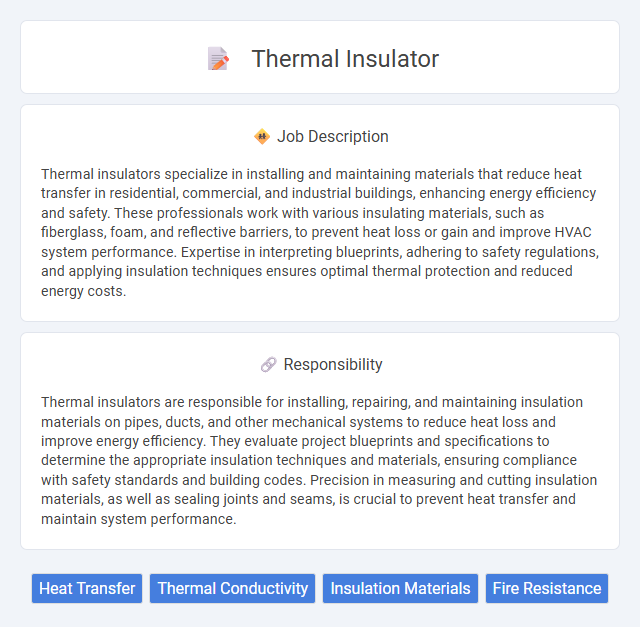
Thermal insulators specialize in installing and maintaining materials that reduce heat transfer in residential, commercial, and industrial buildings, enhancing energy efficiency and safety. These professionals work with various insulating materials, such as fiberglass, foam, and reflective barriers, to prevent heat loss or gain and improve HVAC system performance. Expertise in interpreting blueprints, adhering to safety regulations, and applying insulation techniques ensures optimal thermal protection and reduced energy costs.
Individuals who are physically fit and possess good manual dexterity may be well-suited for a thermal insulator job due to the demands of handling materials and working in confined spaces. Those with a tolerance for heights and varying weather conditions might find this profession more compatible with their abilities. It is probable that people who enjoy hands-on tasks and have a strong attention to detail could adapt effectively to the role of a thermal insulator.
Qualification
Thermal insulators require a strong understanding of heat transfer principles, materials science, and industry-specific safety regulations. Qualifications typically include a high school diploma or equivalent, supplemented by vocational training or apprenticeships in insulation techniques and tools. Certification from recognized bodies such as the National Insulation Association (NIA) enhances job prospects by validating expertise in thermal insulation installation and maintenance.
Responsibility
Thermal insulators are responsible for installing, repairing, and maintaining insulation materials on pipes, ducts, and other mechanical systems to reduce heat loss and improve energy efficiency. They evaluate project blueprints and specifications to determine the appropriate insulation techniques and materials, ensuring compliance with safety standards and building codes. Precision in measuring and cutting insulation materials, as well as sealing joints and seams, is crucial to prevent heat transfer and maintain system performance.
Benefit
Thermal insulator jobs likely offer significant energy savings by reducing heat loss in buildings and machinery, leading to lower utility costs. These roles may improve comfort and safety for occupants by maintaining consistent indoor temperatures and preventing condensation-related damage. Workers in this field probably enjoy steady demand as energy efficiency becomes a growing priority in construction and manufacturing sectors.
Challenge
Thermal insulator jobs likely involve the challenge of working in confined or hard-to-reach spaces, requiring precise installation skills to ensure effective insulation. Workers probably face varying weather conditions or exposure to hazardous materials, increasing safety concerns on site. The complexity of interpreting technical specifications and maintaining strict quality standards may also pose ongoing difficulties.
Career Advancement
Thermal insulators play a crucial role in reducing energy loss by installing and maintaining insulation materials in buildings, industrial equipment, and pipelines. Career advancement opportunities include progressing to supervisory or project management roles, specializing in advanced insulation technologies such as spray foam or reflective barriers, and obtaining certifications like the National Insulation Association (NIA) Certified Insulation Professional credential. Skilled thermal insulators with expertise in energy-efficient solutions and safety compliance are in high demand, leading to increased job stability and higher earning potential.
Key Terms
Heat Transfer
Thermal insulators reduce heat transfer by limiting conduction, convection, and radiation, essential for energy efficiency in buildings and industrial applications. Materials like fiberglass, foam, and mineral wool exhibit low thermal conductivity, effectively trapping air and slowing heat flow. Proper installation of thermal insulation decreases energy consumption and enhances temperature control by minimizing unwanted heat loss or gain.
Thermal Conductivity
Thermal insulators are materials designed to reduce heat transfer by minimizing thermal conductivity, which measures a material's ability to conduct heat. Effective thermal insulators typically have low thermal conductivity values, often below 0.05 W/m*K, making them essential in applications such as building insulation, refrigeration, and industrial processes. Selection of thermal insulating materials depends on factors like temperature range, environmental conditions, and required thermal resistance.
Insulation Materials
Thermal insulators specialize in installing and maintaining materials such as fiberglass, mineral wool, foam board, spray foam, and reflective barriers to reduce heat transfer in residential, commercial, and industrial settings. These insulation materials enhance energy efficiency by minimizing heat loss in heating systems and heat gain in cooling systems, contributing to lower energy costs and improved environmental sustainability. Expertise in selecting and applying the appropriate insulation type ensures optimal thermal performance and compliance with building codes and safety standards.
Fire Resistance
Thermal insulators specializing in fire resistance play a critical role in preventing heat transfer and protecting structures from extreme temperatures. They utilize materials such as mineral wool, ceramic fiber, and calcium silicate to enhance fireproofing capabilities in industrial and residential applications. Effective fire-resistant thermal insulation helps maintain safety standards, reduce energy loss, and minimize the risk of fire damage.
 kuljobs.com
kuljobs.com